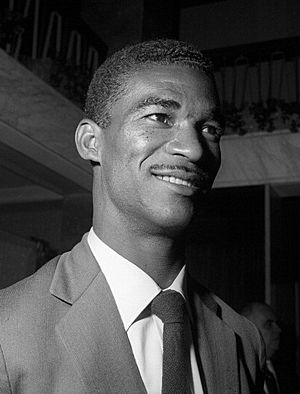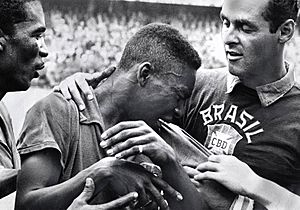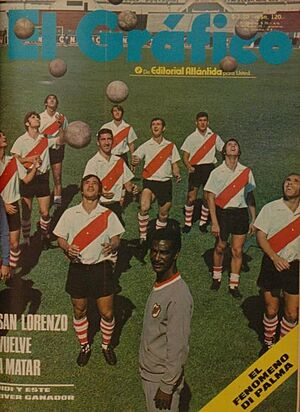Didi (footballer, born 1928) facts for kids

Didi in 1958
|
|||||||||||||||||||||||||||||||||||||
| Personal information | |||||||||||||||||||||||||||||||||||||
|---|---|---|---|---|---|---|---|---|---|---|---|---|---|---|---|---|---|---|---|---|---|---|---|---|---|---|---|---|---|---|---|---|---|---|---|---|---|
| Full name | Waldyr Pereira | ||||||||||||||||||||||||||||||||||||
| Date of birth | 8 October 1928 | ||||||||||||||||||||||||||||||||||||
| Place of birth | Campos dos Goytacazes, RJ, Brazil | ||||||||||||||||||||||||||||||||||||
| Date of death | 12 May 2001 (aged 72) | ||||||||||||||||||||||||||||||||||||
| Place of death | Rio de Janeiro, RJ, Brazil | ||||||||||||||||||||||||||||||||||||
| Height | 1.72 m (5 ft 8 in) | ||||||||||||||||||||||||||||||||||||
| Position(s) | |||||||||||||||||||||||||||||||||||||
| Youth career | |||||||||||||||||||||||||||||||||||||
| 1944 | São Cristóvão FC | ||||||||||||||||||||||||||||||||||||
| 1945 | Industrial | ||||||||||||||||||||||||||||||||||||
| 1945 | Rio Branco | ||||||||||||||||||||||||||||||||||||
| 1945–1946 | Goytacaz | ||||||||||||||||||||||||||||||||||||
| 1946 | Americano | ||||||||||||||||||||||||||||||||||||
| Senior career* | |||||||||||||||||||||||||||||||||||||
| Years | Team | Apps | (Gls) | ||||||||||||||||||||||||||||||||||
| 1947–1949 | Madureira | 32 | (8) | ||||||||||||||||||||||||||||||||||
| 1949–1956 | Fluminense | 150 | (51) | ||||||||||||||||||||||||||||||||||
| 1956–1959 | Botafogo | 64 | (40) | ||||||||||||||||||||||||||||||||||
| 1959–1960 | Real Madrid | 19 | (6) | ||||||||||||||||||||||||||||||||||
| 1960–1962 | Botafogo | 44 | (19) | ||||||||||||||||||||||||||||||||||
| 1962–1964 | Sporting Cristal | 32 | (4) | ||||||||||||||||||||||||||||||||||
| 1964–1965 | Botafogo | 11 | (1) | ||||||||||||||||||||||||||||||||||
| 1965–1966 | CD Veracruz | 29 | (4) | ||||||||||||||||||||||||||||||||||
| 1966 | São Paulo | 4 | (0) | ||||||||||||||||||||||||||||||||||
| International career | |||||||||||||||||||||||||||||||||||||
| 1952–1962 | Brazil | 68 | (20) | ||||||||||||||||||||||||||||||||||
| Managerial career | |||||||||||||||||||||||||||||||||||||
| 1962–1964 | Sporting Cristal | ||||||||||||||||||||||||||||||||||||
| 1967–1969 | Sporting Cristal | ||||||||||||||||||||||||||||||||||||
| 1969–1970 | Peru | ||||||||||||||||||||||||||||||||||||
| 1971 | River Plate | ||||||||||||||||||||||||||||||||||||
| 1972–1975 | Fenerbahçe | ||||||||||||||||||||||||||||||||||||
| 1975 | Fluminense | ||||||||||||||||||||||||||||||||||||
| 1977 | Cruzeiro | ||||||||||||||||||||||||||||||||||||
| 1978–1981 | Al-Ahli (Jeddah) | ||||||||||||||||||||||||||||||||||||
| 1981 | Botafogo | ||||||||||||||||||||||||||||||||||||
| 1981 | Cruzeiro | ||||||||||||||||||||||||||||||||||||
| 1985 | Fortaleza | ||||||||||||||||||||||||||||||||||||
| 1986 | São Paulo | ||||||||||||||||||||||||||||||||||||
| 1986 | Alianza Lima | ||||||||||||||||||||||||||||||||||||
| 1989–1990 | Bangu | ||||||||||||||||||||||||||||||||||||
|
Medal record
|
|||||||||||||||||||||||||||||||||||||
| *Club domestic league appearances and goals | |||||||||||||||||||||||||||||||||||||
Waldyr Pereira, known to many as Didi, was a famous Brazilian footballer. He was born on October 8, 1928, and passed away on May 12, 2001. Didi played as a midfielder or a forward. Many people consider him one of the best football players ever.
He played in three FIFA World Cup tournaments: 1954, 1958, and 1962. He helped Brazil win the World Cup in both 1958 and 1962. In the 1958 tournament, he was even given the Golden Ball award, which goes to the best player.
Didi was known for being a very graceful and skilled player. He could pass the ball really well and had amazing technique. He was also a master at free kicks. He even invented a special type of free kick called the folha seca (dry leaf). This kick made the ball swerve and drop suddenly, making it very hard for goalies to stop. Famous players like Juninho and Cristiano Ronaldo have used this technique.
During his career, Didi played for several top clubs. He was a key player for Fluminense FC in the 1940s and 1950s. Later, in the early 1960s, he became a star for Botafogo FR. At Botafogo, he played alongside other World Cup champions like Garrincha, Nilton Santos, Zagallo, and Amarildo.
Contents
Didi's Early Life and Start in Football
Didi grew up in a poor family in Campos dos Goytacazes, a city in Brazil. As a young boy, he helped his family by selling peanuts. He loved playing football in the streets. When he was 14, he had a serious knee injury that almost led to his leg being removed. Luckily, he recovered and continued to play for local teams in his hometown.
Didi's Amazing Playing Career
Didi started his professional career with Madureira. He became well-known when he joined Fluminense in 1949. He played for Fluminense for seven years, which was his longest time with one club without a break. He played 298 matches and scored 91 goals for them. He helped Fluminense win the Carioca Championship in 1951 and the Copa Rio in 1952.
Didi also made history on June 16, 1950. He scored the very first goal at the famous Maracanã Stadium in a friendly match. He was playing for the Rio de Janeiro youth team at the time. He also helped the Brazilian National team win the 1952 Panamerican Championship in Chile. This was an important early success for the Brazilian team.
World Cup Moments and Club Success
In the 1954 World Cup, Didi scored goals against Mexico and Yugoslavia. Brazil was later defeated by Hungary in a very tough match.
After Fluminense, Didi moved to Botafogo. He helped them win the Campeonato Carioca (Rio state championship) in 1957. Didi had promised to walk from the Maracanã stadium to his home if Botafogo won. When they did, about 5,000 Botafogo fans joined him on his walk!
His biggest success came at the 1958 FIFA World Cup. He was the best player of the tournament, leading Brazil to their first World Cup win from midfield. In his 68 international matches, he scored 20 goals, many of them from his famous free kicks.
Playing for Real Madrid
In 1959, Didi joined Real Madrid in Spain. He played alongside legendary players like Ferenc Puskás, Alfredo Di Stefano, and Francisco Gento. Even though he was a star from the World Cup, he only played 19 matches and scored 6 goals for Real Madrid. He sometimes had disagreements with the team leader, Alfredo Di Stéfano. This led to Didi leaving the club. However, he was still part of the team that won the 1959–60 European Cup.
Return to Botafogo and Retirement
After his time at Real Madrid, Didi returned to Botafogo. This Botafogo team in the early 1960s was one of Brazil's most successful club teams ever. It included stars like Garrincha, Nilton Santos, Zagallo, Amarildo, and promising young players like Manga and Jairzinho. At that time, Botafogo was one of the few clubs that could compete with Pelé's Santos team.
Didi played the most matches for Botafogo in his career: 313 games and 114 goals. He won the Rio championship with them in 1957, 1961, and 1962. He also won the 1962 Rio-São Paulo Tournament and the Paris Tournament in 1963.
In 1965, he moved to Mexico to play for C.D. Veracruz. In 1966, at 38 years old, he joined São Paulo Futebol Clube. He hoped to lead the team with his experience but only played four games. After that, he decided to stop playing and become a coach.
Didi's Coaching Career
After retiring as a player, Didi started coaching with Sporting Cristal. He was then chosen to manage the Peru national team for the 1970 FIFA World Cup. His team, which included stars like Teófilo Cubillas, reached the quarter-finals before being defeated by Brazil.
In 1971, he coached the top Argentine club, River Plate. His most successful coaching period was with the Turkish team Fenerbahçe. He led them to win two Turkish First Division titles in a row in 1973–1974 and 1974–1975.
Didi also coached many other important clubs in Brazil, like Fluminense and Botafogo. He also managed teams in Peru, Kuwait, and Saudi Arabia.
Didi's Later Years and Legacy
In October 2000, Didi was honored and added to the FIFA Hall of Champions. By this time, he was quite ill. He passed away the following year in Rio de Janeiro, at the age of 72, due to health problems.
Didi is remembered as a football legend who changed the game with his skill and his famous "dry leaf" free kick.
Didi's Achievements and Awards
As a Player
International Titles
- Brazil
- FIFA World Cup: 1958, 1962
- Copa Oswaldo Cruz: 1955, 1958, 1961, 1962
- O'Higgins Cup: 1955, 1961
- Pan American Games: 1952
- Atlantic Cup: 1956
Club Titles
- Botafogo
- Campeonato Carioca (Rio State Championship): 1957, 1961, 1962
- Torneio Rio – São Paulo: 1962
- Pentagonal Club of Mexico: 1962
- Fluminense
- Copa Rio: 1952
- State Championship: 1951
- Real Madrid
- European Cup: 1960
- Ramon de Carranza Trophy: 1959
Individual Awards
- FIFA World Cup Golden Ball: 1958 (Best player of the tournament)
- FIFA World Cup All-Star Team: 1958
- IFFHS Brazilian Player of the 20th Century (7th place)
- IFFHS World Player of the 20th Century (19th place)
- Brazilian Football Museum Hall of Fame
- Ballon d'Or Dream Team (Bronze): 2020
See also
 In Spanish: Didí para niños
In Spanish: Didí para niños
 | Selma Burke |
 | Pauline Powell Burns |
 | Frederick J. Brown |
 | Robert Blackburn |



